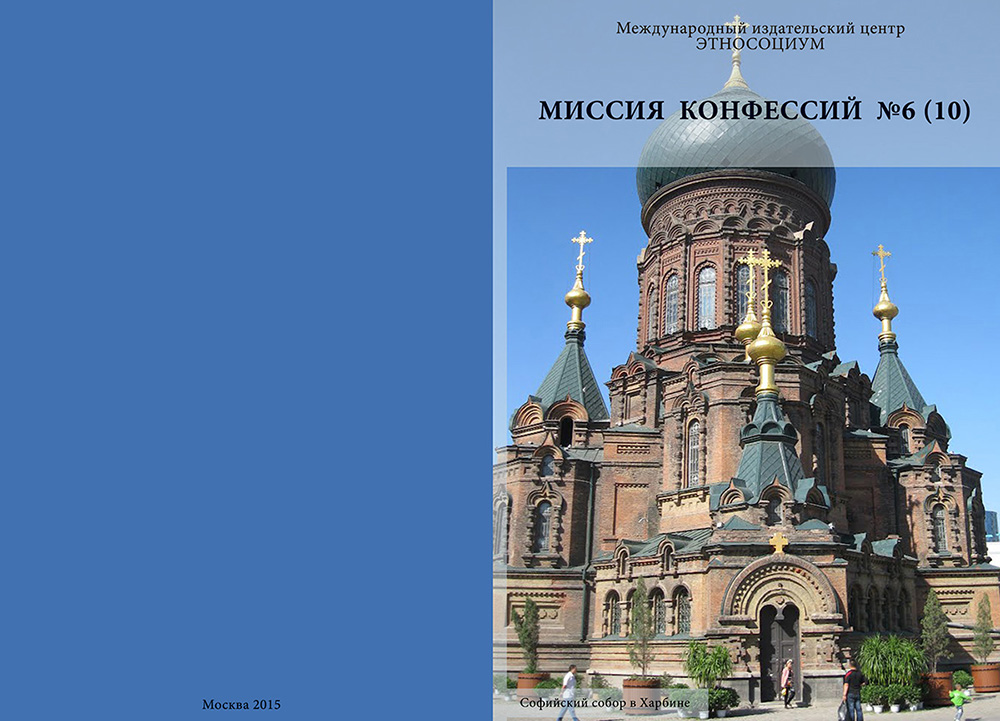Content
|
PHILOSOPHY, SOCIOLOGY AND CULTURE
|
|
|
Zyazikov M.M. The role of the Russian language in the modern world
|
6
|
|
Dzutsev H.V., Dibirova A.P., Hugaeva А.А. The current state of religious extremism in Russian sociological literature
|
18
|
|
Semenova V.I. Religious totalitarianism and mind control in new religious movements
|
30
|
|
CHRISTIANITY IN THE MODERN WORLD
|
|
|
Chjan Vei Orthodoxy in China: some historical aspects
|
38
|
|
Ternovaya L.O. Sisters of Charity: the symbolism of the image and the reality of aid
|
41
|
|
CATHOLICISM: TRENDS AND PROSPECTS
|
|
|
Message from the Pope "city and the world": "Where God is born, blooms charity"
|
53
|
|
Abstracts
|
56
|
|
Authors
|
58
|
Abstracts
Zyazikov M.M.
The role of the Russian language in the modern world
It is pointed out that Russia’s leading role on the world arena will be accompanied by a growing significance of the Russian language in the conditions of the new configuration of powers and multipolarity. In the article, the author is rethinking the role of the Russian language in the modern conditions, which opens new ways to study it and spread Russian in the multinational Russian society and beyond it. Using practical examples, the author shows that expansion of cultural space of the Russian language defines the formation of supranational unity. Besides, horizontal and vertical planes of language construction are offered, as well as some concrete measures of development and maintaining the language as a source of world communication.
Keywords: the role of the Russian language in the modern conditions; the Russian language and the supranational unity; language construction; Russia as a multinational developmental model.
Dzutsev H.V.
Dibirova A.P.
Hugaeva А.А.
The current state of religious extremism in Russian sociological literature
This article is written on the materials of the modern sociological literature on Russian religious extremism.
Keywords: militant doctrine of absolute divinity, the fear of death, the clash of civilizations, Islamic radicalism, “forest brothers”, the rise of religious consciousness, growth in the number of mosques, economic problems, unemployment, socio-economic structure of the Highlanders, “holy war”, ethno-nationalism, post-industrial society, Christian countries.
Ternovaya L.O.
Sisters of Charity: the symbolism of the image and the reality of aid
The concept of “Sisters of Charity” and the first community appeared in the XVII century on the eve of the Thirty Years’ War. And since that time the figure of a nun, associated with monastic service, has become obligatory in rendering assistance both both to victims on the battlefield and civilians. Different countries have developed different rules for creating such communities and access to patients. In Russia, its hallmark was interfaith character of sisters’ communities, which corresponded with the interfaith spirit of government.
Keywords: nuns, nurse, international relations, symbolic figures, interfaith mission.
Semenova V.I.
Religious totalitarianism and mind control in new religious movements
In this article the author explores the phenomenon of totalitarianism in new religious movements. There is a classification of signs of religious totalitarianism. The stages of changes in consciousness among members of religious sects are described, as well as management techniques used by leaders of new religious movements.
Keywords: religious totalitarianism, new religious movements, mind control, religious cult.
Authors
Dibirova A.P., Candidate of Biological Sciences, a senior researcher of the North Ossetian Institute of Social Research Center of the Institute of Social and Political Studies of the Russian Academy of Sciences.
Dzutsev H.V., Doctor of Social Sciences, head of the North Ossetian Social Research Center, Institute of Socio-Political Studies, Head of the department of sociology and social processes of the K.L. Khetagurov North Ossetian State University, Vladikavkaz.
Chjan Vei, Postgraduate researcher, Department of Foreign Journalism and Literature, Faculty of Journalism, Lomonosov Moscow State University.
Hugaeva А.А., Candidate of Sociological Sciences, Assistant Professor of sociology and social processes of the K.L. Khetagurov North Ossetian State University, Vladikavkaz.
Semenova V.I., Candidate of Political Sciences, Head of the department of the Veterans Fund of the Navy.
Ternovaya L.O., Doctor of Historical Sciences, Professor (MADI, Moscow Automobile and Road Construction University).
Zyazikov M.M., Deputy Plenipotentiary Representative of the President of the Russian Federation in the Central Federal District, Doctor of Philosophical Sciences, member of the Writers’ Union of Russia.





